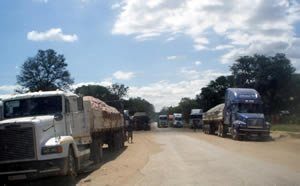 Chirundu Boarder Post (the Western Zambezi River boarder post between Zimbabwe and Zambia) like most boarder posts is a hive of activity with a lot of human and commercial goods crossing the border on a daily basis. Long ques of commercial trucks in transit are a common and regular sight as they wait their turn to be cleared on both sides of the boarder before they can proceed with their journeys. More often than not the final destinations are not only Zimbabwe or Zambia but countries as far as Democratic Republic of Congo (DRC), Tanzania, South Africa (Johannesburg, Pretoria, Durban and Cape Town).
Chirundu Boarder Post (the Western Zambezi River boarder post between Zimbabwe and Zambia) like most boarder posts is a hive of activity with a lot of human and commercial goods crossing the border on a daily basis. Long ques of commercial trucks in transit are a common and regular sight as they wait their turn to be cleared on both sides of the boarder before they can proceed with their journeys. More often than not the final destinations are not only Zimbabwe or Zambia but countries as far as Democratic Republic of Congo (DRC), Tanzania, South Africa (Johannesburg, Pretoria, Durban and Cape Town).
Long distance driving is a male dominated profession and most drivers are aware that they have long been implicated in the early geographical spread of HIV in Southern Africa. Drivers often travel long distances and spend long periods away from their families. Strangling delivery deadlines, in some cases poor salaries and very brief periods of rest between deliveries – these working conditions and tendency for high risky sexual behaviour of transport industry employees make them very vulnerable to HIV infection.
Due to various HIV interventions including the Hear our voice! Speaking out for HIV services and care support in Zimbabwe project, many long distance drivers are aware of their vulnerability and their HIV and AIDS awareness and prevention knowledge levels are reasonably high.
 The Chirundu Roadside Wellness Clinic is solicited by an average forty (40) people daily, nearly half of this number comprises Long Distant Drivers and commercial sex workers with the rest being drawn from the local community.
The Chirundu Roadside Wellness Clinic is solicited by an average forty (40) people daily, nearly half of this number comprises Long Distant Drivers and commercial sex workers with the rest being drawn from the local community.“I have benefited greatly from the regular HIV and AIDS discussions we hold with Sister Shami (NECTOI Chirundu Site Agent) and the information she gives us. As a result I get tested for HIV on a regular basis at the Wellness Roadside Clinic. She has motivated me to be an HIV and AIDS advocate among my fellow drivers. I sometime accompany or bring my friends to te